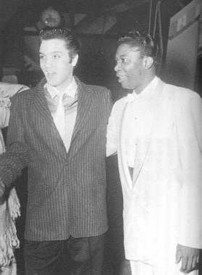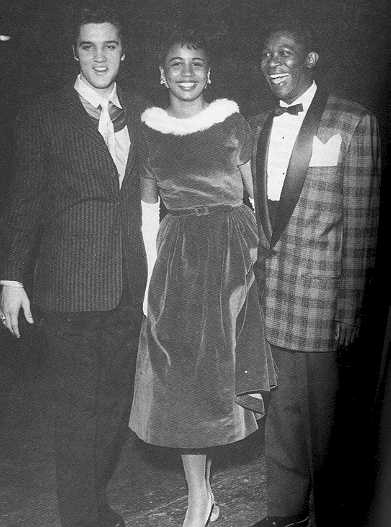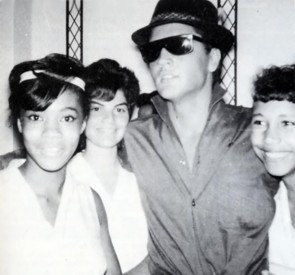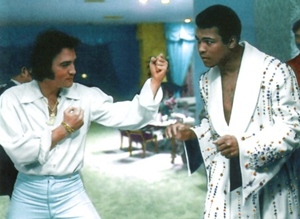 |
 |

'Elvis was not a racist' EIN sets the record straight by Peter Guralnick, The New York Times, 12 August 2007 ONE of the songs Elvis Presley liked to perform in the ’70s was Joe South’s “Walk a Mile in My Shoes,” its message clearly spelled out in the title. Sometimes he would preface it with the 1951 Hank Williams recitation “Men With Broken Hearts,” which may well have been South’s original inspiration. “You’ve never walked in that man’s shoes/Or saw things through his eyes/Or stood and watched with helpless hands/While the heart inside you dies.” For Elvis these two songs were as much about social justice as empathy and understanding: “Help your brother along the road,” the Hank Williams number concluded, “No matter where you start/For the God that made you made them, too/These men with broken hearts.”
And yet, as the legendary Billboard editor Paul Ackerman, a devotee of English Romantic poetry as well as rock ’n’ roll, never tired of pointing out, the music represented not just an amalgam of America’s folk traditions (blues, gospel, country) but a bold restatement of an egalitarian ideal. “In one aspect of America’s cultural life,” Ackerman wrote in 1958, “integration has already taken place.” It was due to rock ’n’ roll, he emphasized, that groundbreaking artists like Big Joe Turner, Ray Charles, Chuck Berry and Little Richard, who would only recently have been confined to the “race” market, had acquired a broad-based pop following, while the music itself blossomed neither as a regional nor a racial phenomenon but as a joyful new synthesis “rich with Negro and hillbilly lore.” No one could have embraced Paul Ackerman’s formulation more forcefully (or more fully) than Elvis Presley. Asked to characterize his singing style when he first presented himself for an audition at the Sun recording studio in Memphis, Elvis said that he sang all kinds of music — “I don’t sound like nobody.” This, as it turned out, was far more than the bravado of an 18-year-old who had never sung in public before. It was in fact as succinct a definition as one might get of the democratic vision that fueled his music, a vision that denied distinctions of race, of class, of category, that embraced every kind of music equally, from the highest up to the lowest down. It was, of course, in his embrace of black music that Elvis came in for his fiercest criticism. On one day alone, Ackerman wrote, he received calls from two Nashville music executives demanding in the strongest possible terms that Billboard stop listing Elvis’s records on the best-selling country chart because he played black music. He was simply seen as too low class, or perhaps just too no-class, in his refusal to deny recognition to a segment of society that had been rendered invisible by the cultural mainstream.
That same year, Elvis also attended the otherwise segregated WDIA Goodwill Revue, an annual charity show put on by the radio station that called itself the “Mother Station of the Negroes.” In the aftermath of the event, a number of Negro newspapers printed photographs of Elvis with both Rufus Thomas and B.B. King (“Thanks, man, for all the early lessons you gave me,” were the words The Tri-State Defender reported he said to Mr. King). When he returned to the revue the following December, a stylish shot of him “talking shop” with Little Junior Parker and Bobby “Blue” Bland appeared in Memphis’s mainstream afternoon paper, The Press-Scimitar, accompanied by a short feature that made Elvis’s feelings abundantly clear. “It was the real thing,” he said, summing up both performance and audience response. “Right from the heart.” Just how committed he was to a view that insisted not just on musical accomplishment but fundamental humanity can be deduced from his reaction to the earliest appearance of an ugly rumor that has persisted in one form or another to this day. Elvis Presley, it was said increasingly within the African-American community, had declared, either at a personal appearance in Boston or on Edward R. Murrow’s “Person to Person” television program, “The only thing Negroes can do for me is buy my records and shine my shoes.” That he had never appeared in Boston or on Murrow’s program did nothing to abate the rumor, and so in June 1957, long after he had stopped talking to the mainstream press, he addressed the issue — and an audience that scarcely figured in his sales demographic — in an interview for the black weekly Jet. Anyone who knew him, he told reporter Louie Robinson, would immediately recognize that he could never have uttered those words. Amid testimonials from black people who did know him, he described his attendance as a teenager at the church of celebrated black gospel composer, the Rev. W. Herbert Brewster, whose songs had been recorded by Mahalia Jackson and Clara Ward and whose stand on civil rights was well known in the community. (Elvis’s version of “Peace in the Valley,” said Dr. Brewster later, was “one of the best gospel recordings I’ve ever heard.”)
Chuck D has long since repudiated that view for a more nuanced one of cultural history, but the reason for the rumor’s durability, the unassailable logic behind its common acceptance within the black community rests quite simply on the social inequities that have persisted to this day, the fact that we live in a society that is no more perfectly democratic today than it was 50 years ago. As Chuck D perceptively observes, what does it mean, within this context, for Elvis to be hailed as “king,” if Elvis’s enthronement obscures the striving, the aspirations and achievements of so many others who provided him with inspiration? Elvis would have been the first to agree. When a reporter referred to him as the “king of rock ’n’ roll” at the press conference following his 1969 Las Vegas opening, he rejected the title, as he always did, calling attention to the presence in the room of his friend Fats Domino, “one of my influences from way back.” The larger point, of course, was that no one should be called king; surely the music, the American musical tradition that Elvis so strongly embraced, could stand on its own by now, after crossing all borders of race, class and even nationality. “The lack of prejudice on the part of Elvis Presley,” said Sam Phillips, the Sun Records founder who discovered him, “had to be one of the biggest things that ever happened. It was almost subversive, sneaking around through the music, but we hit things a little bit, don’t you think?” Or, as Jake Hess, the incomparable lead singer for the Statesmen Quartet and one of Elvis’s lifelong influences, pointed out: “Elvis was one of those artists, when he sang a song, he just seemed to live every word of it. There’s other people that have a voice that’s maybe as great or greater than Presley’s, but he had that certain something that everybody searches for all during their lifetime.” To do justice to that gift, to do justice to the spirit of the music, we have to extend ourselves sometimes beyond the narrow confines of our own experience, we have to challenge ourselves to embrace the democratic principle of the music itself, which may in the end be its most precious gift. Read more about "Elvis and racism" Click to comment on this article
Feedback Mark Tibballs: The thought that Elvis was racist is a powerful but flawed argument designed to promote division in society through its musical underpinnings. Will the sentiment ever go away? I doubt it will as long as there is inequality, ghetto poverty, unemployment, poor health systems and a mass of people who need to find an outlet to further their push for justice. It is a misguided argument but it will always strike a chord with a minority regardless of color, race or religion. Kim H: Of course Elvis was racist. That's why he bought so many things for black Americans, even those he didn't know. I hope I never meet this vile woman. (edited by EIN) Frank Sutor: What a great role model Mary J. Blige is. She reminds me of the old American right wing. Shoot first and ask questions later. What a tosser. Tania Mountford: It is sad people like Mary J. Blige make ill informed statements like they do. Their ignorance only underlines their lack of understanding and inability to check their facts before opening their big fat mouth. Tony: Mary J. Blige - go to hell, you stupid, unthinking woman. Barbara Taylor: I say boycott Mary J. Blige's next release. Bronwyn Wynn: I can't believe Mary J. Blige actually believes what she says. Hasn't she at least tried to verify the facts? It seems she has been very quick to accept the unfounded rhetoric of a politically motivated and flawed past. Still I don't think we'll be hearing from her in a few years, but we sure will be hearing about Elvis!!! Long live the King! Carlie: Elvis was the sweetest most generous man who ever lived. Anyone who thinks he was racist hasn't looked into his life. Brian (UK): Elvis racist. You've got to be kidding. What planet are these people from? Sid: Mary J. Blige is a tool. Jen T: What sort of crap are they teaching in US schools today? Mary J. Blige needs a re-education for her stupid comments as she has shown she knows nothing about Elvis. Frederick Seymour: Personally I quite like the music of Mary J. Blige but her politics stinks! She is a product of tabloid media and an unthinking piblic. Very sad but a sign of what we can expect in the future. Steven Parsons: Mary J. Blige can winge all she wants but I doubt anyone will be talking about her in 30 years time! What a precious, misinformed wannabe she is. Cindy Shutts: What a well written article by Peter Guralnick. It should be mandatory reading for all students of Elvis and popular music. Bobby C: Who the f... is Mary J. Blige anyway? Marty Lacker: I read the article regarding Elvis as a racist and it is my intention to reach Mary J. Blige and give her the real story about Elvis' supposed racism. This rumor was started years ago by someone and has been picked up mainly by young black artists most of whom were not even born when Elvis started and they believe the crap about him stealing the black man's music and that he was a racist. That's nonsense.
I intend to tell her some things that Elvis did for black people that like everything else he did was done without publicity because he just liked to see the joy on people's faces when he did it for them.
It's getting tiresome reading this false accussation about Elvis who had a great affinity for black people.
As for stealing the black man's music, I quote the great Ray Charles, "MUSIC HAS NO COLOR!'
Ida Ritter: As was said before this is an article that should be read by all and every Elvis fan, it really describes the real soul and reason for this man's singing. As somebody said before: he made America step down, but to this day the controversy persists on calling him a racist, why is yet to be discovered. He was a humble man, that always gave credit to whoever he thought deserves it regardless of their race or color, he always was very uncomfortable when called the King of Rock an Roll, but the fact that to this day he is in top of all what a singer could ever be creates all source of stories to opaque his real inner in him fortunately with no success. This article clearly portraits who Elvis was and why at the end he even ignored some of the comments always made to obscure his tremendous impact in the music history of this country and the world, but to the end I have to say as a fan that his life, his God's given voice, his actions, the way the sang and gave himself out as no other entertainer ever had, throughout his life talks better than anything anybody could say, sad to see the ones that still do not want to accept a reality that has always been there and that portraits what he really was, not letting anybody control what he really believe in no matter what. Even Sam Phillips the discover of this man said it all, and he knew him from the start of his tremendous carrier, to think of all the enduring he had to do during his life, when at the time of his beginnings it was hard to accept by a lot the change that was coming in and the way America use to act especially at the time of so much racism that still prevails to this day. His life said it all, and this article is one that confirms it. Sandy: Thank you for publishing Peter Guralnick's article I found it fascinating. Why don't these knockers do their homework and find out just what Elvis thought of his musical peers and how he helped Black Americans. Marjorie Robins: Elvis was not a racist! To even think so is a ridiculous thing. How could someone who was racist buy a new Cadillac for a Black American woman who he didn't even know? It saddens me deeply that ill minded and misinformed people want to desicrate Elvis' good name!!! Peter S: The whole argument about misappropriating black music is spurious. When was musical style ever the restricted domain of one group of people! Thomas J: Well said Peter Guralnick. Andrew Parker-Smith: The world is full of small minded, bigoted asses who wouldn't know goodness if it hit them in the face or kicked them up their sorry backsides. Elvis racist. Nothing could be further from the truth.
|
|




